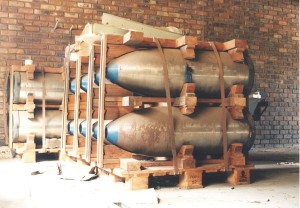by Daryl G. Kimball
Is a world free of nuclear weapons possible? Do states that have developed nuclear weapons have the vision and the courage to verifiably eliminate their nuclear arsenals? As South Africa has shown, some do. Others can.
 The casings made for the atomic bombs and stored at Advena. (Image Source: http://nuclearweaponarchive.org/)
The casings made for the atomic bombs and stored at Advena. (Image Source: http://nuclearweaponarchive.org/)
July 10 marks the 20th anniversary of the Republic of South Africa's signature of the nuclear Nonproliferation Treaty (NPT) as a non nuclear-weapon state, making it the first and -- so far -- the only country to build nuclear weapons and then later to voluntarily abandon them. South Africa's nuclear weapons program spanned the 1970s and 1980s and led to the development and production of six nuclear bombs. The decision by then-president FW de Klerk to wind down the program and join the NPT was shaped in part by South Africa's apartheid-era isolation, the resolution of its military engagement in Namibia, and the movement toward majority rule. In the years since its accession to the NPT, South Africa has become a leading force in the global effort to advance nuclear disarmament and nonproliferation, while it has sought to protect access by nonnuclear weapon states to the peaceful use of nuclear energy.
The history of South Africa's nuclear weapons program and the events and decisions that led to its decision to verifiably abandon its arsenal are detailed in a December 1995 article "South Africa's Nuclear Weapons Program: From Deterrence to Dismantlement" in Arms Control Today by Waldo Stumpf, who was at the time the chief executive officer of the Atomic Energy Corporation of South Africa.
